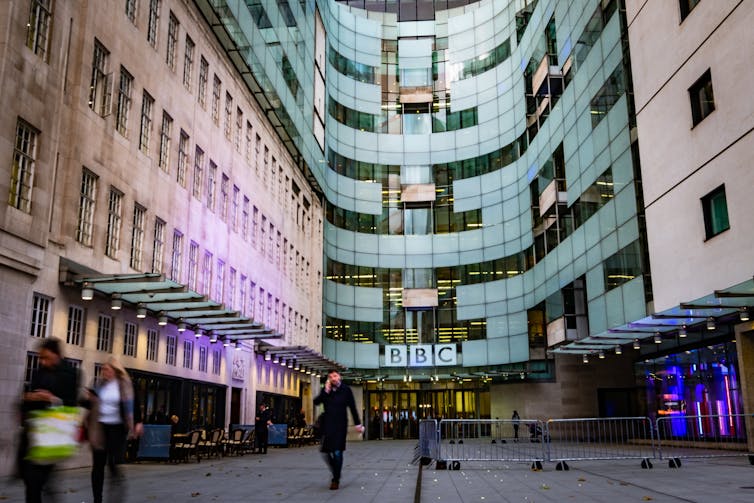The way we get our news is changing fast. The latest research from the Reuters Institute for the Study of Journalism at Oxford University shows that, around the world, news consumers are turning to Facebook, Instagram, X and TikTok rather than television, radio or newspapers. Nearly a quarter of adults under 24 get their news from TikTok.
You may have come across terms describing (or deriding) sources as “new media”, “independent media” or “biased”. These words can be opaque and sometimes used to discredit valuable sources. Here are a few key concepts to understand today’s news environment.
“New” v “traditional” media
The first news websites appeared 30 years ago. But the term “new media” still refers to news providers that primarily deliver content digitally, whether through websites or apps.
Publishers have long struggled to make these digital forms of news pay through advertising. However, in the past few years, more digital publishers have instead tried to raise revenues through subscriptions.
“Traditional media”, “legacy media”, or, sometimes, the increasingly outdated term “mainstream media” all refer to news organisations that predated the internet and have tried to adapt to the digital distribution of news. These organisations – like the BBC and New York Times – have done so while continuing to offer their older services, like TV or radio broadcasts and newspapers, to declining audiences.
Independent media
Historically, “independent media” has referred to media organisations independent of government control, that can exercise their rights to freedom of expression. This is in contrast to “state-controlled media”, which is usually found in totalitarian states and under the editorial control of the government.
Want more UK politics coverage from academic experts? Every week, we bring you informed analysis of developments in government and fact check the claims being made.
Sign up for our weekly politics newsletter, delivered every Friday.
Although some public service broadcasters, such as the BBC, receive money from governments or raised from licence fee payers, they are editorially independent. The BBC’s independence is guaranteed by its Royal Charter, which outlines its purposes and legal rights.
“Independent” has recently taken on a second meaning, which tends to be used interchangeably with “alternative media”. This refers to news publishers that are not only free of state control but also not part of the commercial news industry.
These organisations usually publish on themes that others may ignore, such as LGBTQ+ issues or marginalised political views.
News influencers
There has been a recent surge in news influencers: people with large social media followings who comment or explain the news to their audiences. They might be podcasters, such as Joe Rogan, or content creators on platforms like YouTube or TikTok, such as Dylan Page (News Daddy).

William Barton/Shutterstock
News influencers don’t work like traditional reporters, who are expected to create original stories, perhaps in accordance with a regulatory or legal set of rules, or with an eye to journalistic values such as factchecking or double-sourcing claims.
News influencers tend to prioritise the authenticity of their brand and personality, and the relationship with their audiences. They comment on stories already trending on social media, rather than unearthing their own news stories. This has allowed them to build large, loyal followings, but has prompted concerns about the veracity of the content they publish.
Read more:
‘News influencers’ are racking up billions of views – and not checking their facts
Public interest journalism
The “public interest” is a much abused and misunderstood term. High-quality journalism that reveals information that the powerful would prefer to keep concealed is said to be in the public interest. That means revealing facts that benefit the welfare and wellbeing of the public at large, and add to public debate. It does not mean information that members of the public might be interested in, such as the sexual proclivities of the rich and famous.
Editors have long justified the publication of news stories that might be defamatory by citing the public interest. For example, the BBC and the Guardian’s reporting on how leading politicians used offshore tax havens.

Yuri A/Shutterstock
Objectivity, neutrality and impartiality
These terms tend to be used interchangeably but, in fact, mean different things. Objectivity has its roots in American journalism in the early 20th century, where journalists sought to make reporting more scientific through factchecking, finding primary sources and weighing evidence to establish what was true.
Neutrality means the journalist being nonpartisan and disinterested in their reporting.
Impartiality, or at least due impartiality, is a legal requirement for UK news broadcasters and requires them to consider all points of view in their reporting without favouring any political position. This has become increasingly contested in the UK, with new broadcasters such as GB News, publishing current affairs content that is more opinionated.
All of these approaches have increasingly been criticised. Critics argue that supposedly “objective” publications are failing audiences by equating truth and lies or failing to consider the cultural biases of reporters, or the importance of journalists’ personal experience and opinions.
News avoidance
The pandemic, wars, the pervasive nature of news on social media and the tendency of users to “doomscroll” have all contributed to more people saying they are trying to avoid the news. This may be to protect their mental health, or because they prefer to give their limited time and attention to more positive content.
When surveyed, habitual news avoiders say they find the news depressing, irrelevant or unintelligible. While some may feel that this is people avoiding their civic duty to be informed about their societies, many feel it is a rational response to the 24/7 news cycle. This presents a challenge to journalists who want to produce stories that inform and engage audiences.

The post “the terms you need to know to understand news today” by Matt Walsh, Head of the School of Journalism, Media and Culture, Cardiff University was published on 01/22/2025 by theconversation.com






































Leave a Reply